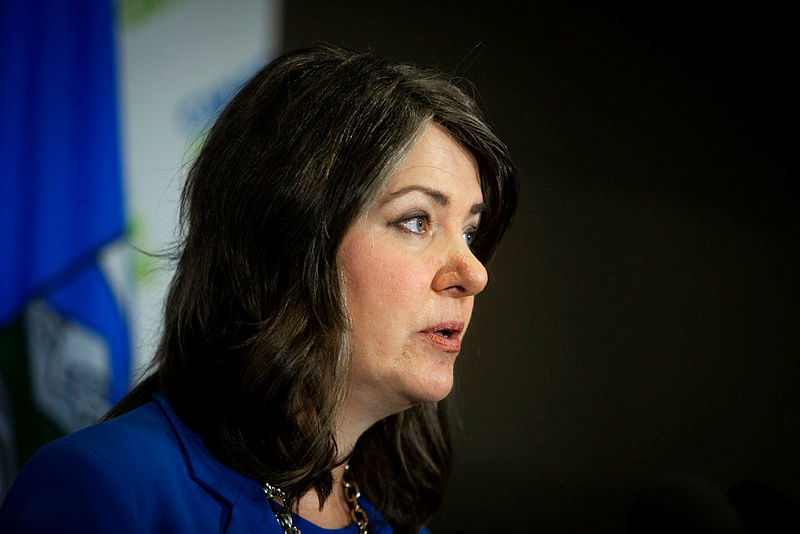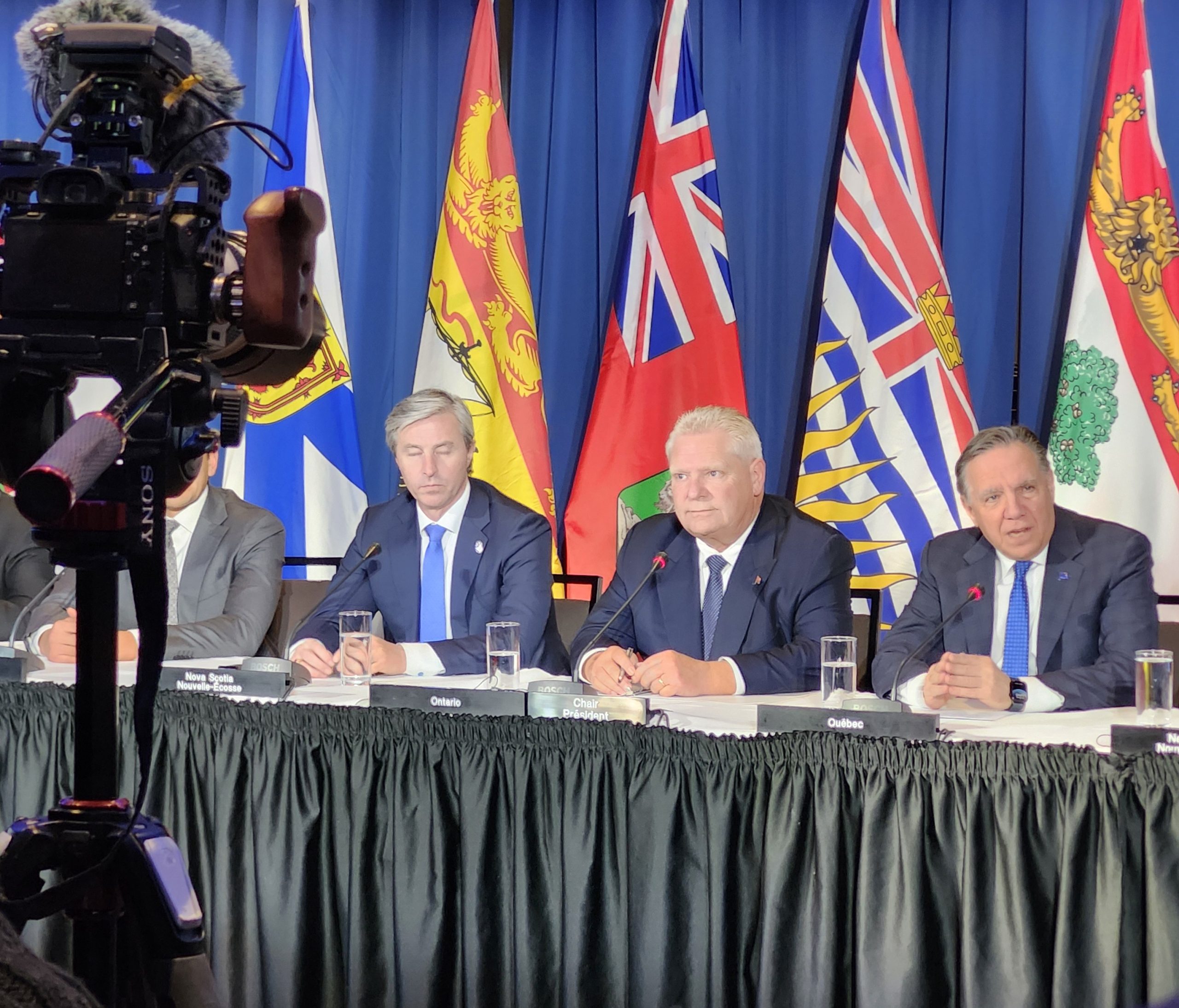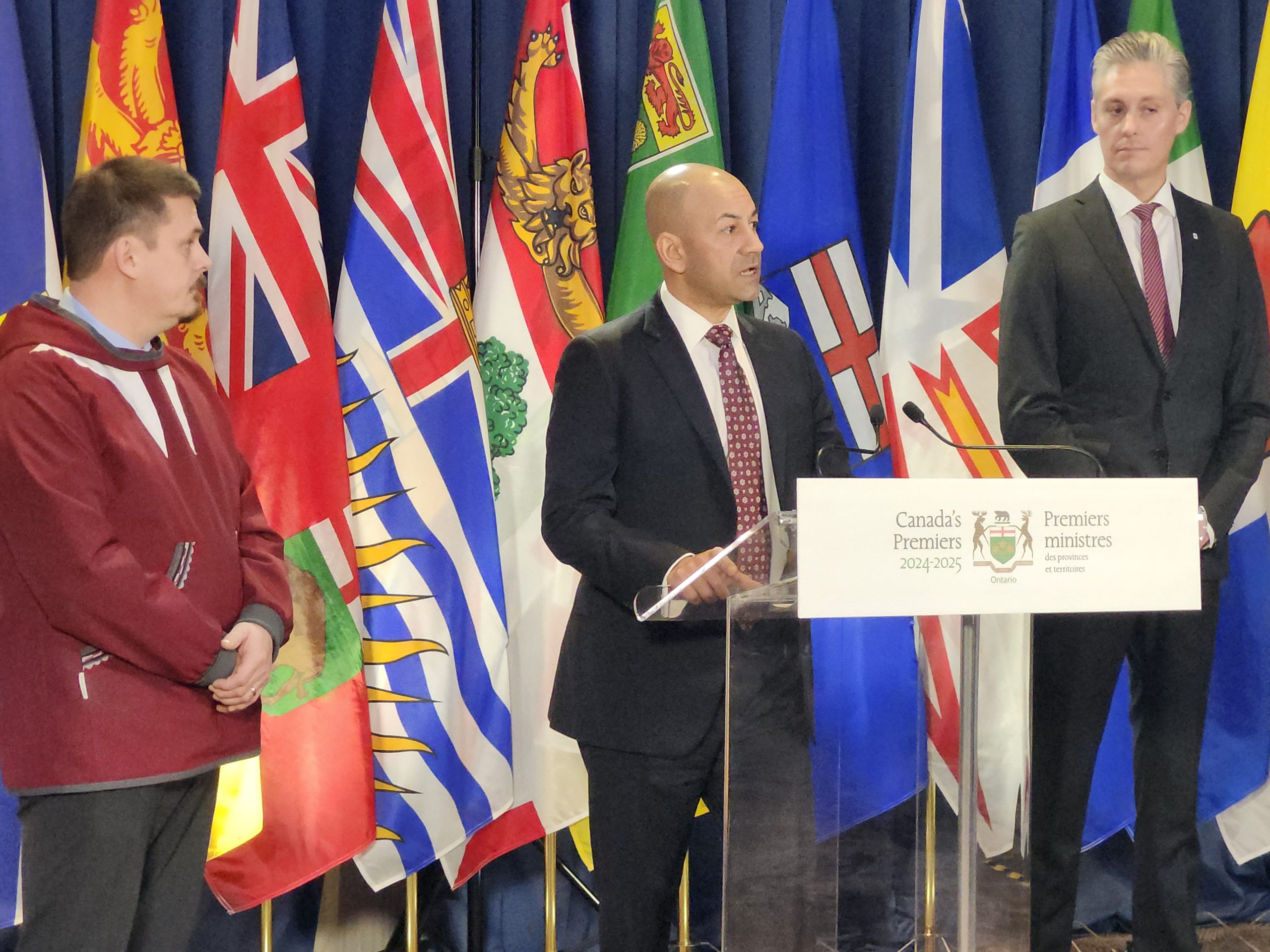Research Exclusive
- Joanne Thompson takes over seniors portfolio; Holland and Saks remain in health
- Premiers looking at interim pricing for new medicines, says Alberta premier
- ‘We’ve gone through a lot’: Andrew Casey reflects on leading and leaving BIOTECanada
- Mark Holland’s Economic Club of Canada appearance in 7 points
- Federal dollars for brain research strategy is good for brain health and keeping researchers in Canada, says advocate
- What will it take to fix primary care? Doctors and Ontario’s chief nursing officer weigh in
- UPDATED: Canadian Public Health Association seeks donations to stay afloat past 2025
- Breast cancer screening info exchange coming in 2025, says PHAC
- Canada Health Act letter ‘needs to be done right,’ says health minister as nursing advocates push for its release
- CMHA tears down the silo of mental health advocacy by bringing different interest groups on board
Premiers looking at interim pricing for new medicines, says Alberta premier

Alberta Premier Danielle Smith said that provinces and territories are discussing the possibility of setting an interim price for new medicines while negotiations for a permanent price continue.
Smith’s comments came during an interview with Hill Times Health following a Council of the Federation (COF) meeting on Dec. 15 and Dec. 16 in Mississauga, Ont.
“What we agreed to today is, let’s figure out an interim price so that we can get the drugs immediately out to the people who need them as soon as they’re approved, and then we can take a longer time to figure out what the long-term price is going to be. That’s what we’re working on today,” Smith said.
Ontario Premier Doug Ford, who is the current chair of COF, has declared that speeding up access to new medicines is one of his priorities while he leads the group of premiers.
Smith told Hill Times Health that there was a “good deep conversation” on the issue of access to medicines and that it was the only health care priority discussed at COF.
“All of the provinces are engaging in a lot of health reform, and so there’ll be a lot of future meetings where we’re going to be able to share our successes. But the focus today was on trying to speed up the approval of drugs for use in the Canadian market, and so it was a very specific issue we were trying to solve,” Smith said.
RELATED: PHARMACARE AND CANOLA TALKS ACTIVE DURING Q3
The new drug pathway in Canada mainly consists of actions at the federal level: Health Canada approves medicines for safety; Canada’s Drug Agency provides a recommendation to most provinces (with the exception of Quebec, which has its own agency) and all territories as to whether they should cover a new medicine through their public formularies; and the Patented Medicine Prices Review Board studies the price of a new drug to determine if it would be considered excessive by its standards.
Where the provinces and territories may have some impact in shortening the timeline from drug approval to public availability is during the pricing negotiation process, which is led by the pan-Canadian Pharmaceutical Alliance (pCPA). The alliance is an independent organization that represents provincial and territorial governments in negotiations with drug manufacturers to determine the price that these jurisdictions will pay to cover a new medicine through their formularies.
The COF meeting on Dec. 16 occurred in the context of intense political news out of Ottawa. Liberal MP Chrystia Freeland (University–Rosedale, Ont.) resigned from her post as deputy prime minister and finance minister just hours before she was supposed to read an already-delayed Fall Economic Statement. The federal cabinet upheaval–which included the loss of Liberal MP Sean Fraser (Central Nova, N.S.) as housing minister that same day–is occurring as Canada prepares its response to president-elect Donald Trump’s threat of a 25-per-cent tariff on all Canadian goods exported to the United States.
During the premiers’ press conference signalling the end of the two-day COF meeting, they stressed their own unity as a group and the importance of presenting a unified front in light of the economic threat presented by the incoming U.S. administration.
Ford said that the issue of access to medicine was one of three key priorities discussed amongst the premiers, who also focused on energy resources and relations between the Canadian and the United States governments.
RELATED: PMPRB will not be folded into Canadian Drug Agency: Health Canada

On the subject of medicines, Ford said that the premiers agreed to ask their health ministers to develop a pilot project that would contribute to a shorter timeline for medicines from receiving regulatory approval to being available to Canadians.
He said that of all G7 countries, Canadians have the longest wait time to receive new medicines. (In a letter to the pCPA on April 19, 2024, about the length of time it takes for public access to medicines, Ford wrote that Canadians “wait nearly two years to access new publicly funded medicines, a full year longer than patients in other developed countries.” Ford’s office provided the letter to Hill Times Health on Dec. 15.)
“This needs to change,” said Ford. “Premiers agreed to direct our ministers of health to develop a plan for a new pilot project that would cut the drug approval process by nine months and get drugs to patients as soon as they receive a positive funding recommendation from Canada’s Drug Agency.”
Ford added that the pilot project would focus on the seven to 10 cancer drugs that are a part of Project Orbis, an international project that aims to speed up access to cancer medicines.
Health Canada and the United States Food and Drug Administration are two of the international regulators involved in the project. A Government of Canada webpage about the project states that the pharmaceutical regulators are working together on the review of submissions for cancer drugs.
Referring to the pCPA’s role in coming to a negotiated price with manufacturers, Ford said this on Dec. 16 about the to-be-developed pilot project: “Negotiations would begin immediately to determine the final list price with manufacturers accepting specific obligations around cost and coverage. This proposal only works if drug manufacturers come to the table in good faith and with a desire to help.”
Hill Times Health asked Ford during the press conference what specifically provincial and territorial governments could do within their jurisdiction to speed up access. Ford did not directly answer the question but focused his response on the need to cut down on the amount of time it takes for medicines to be available to Canadians.
Territories’ premiers weigh in on health priorities

During an earlier press conference on Dec. 16, Yukon Premier Ranj Pillai said that northern territories are thinking more broadly than approval to medicines when it comes to improving health care in their jurisdictions.
“The conversation that we normally bring to the table is really the cost of health care in the North. It’s extraordinary,” Pillai said during a press conference that focused on the priorities of the Yukon, Nunavut and the Northwest Territories. Pillai was responding to Hill Times Health’s question about their health-related focus for the COF meeting.
“Many of [Yukon’s] key services are provided by B.C., so we fly people out to see specialists. What we’re seeing right now is just with the complexity of our patients and the aging of patients, the aging of our population … we’re seeing our budgets rise,” he said.
Pillai also said a key focus for him during the COF meeting is health care infrastructure and the need to build new infrastructure.
Nunavut Premier P.J. Akeeagok during that same press conference echoed the need for improved infrastructure.
“In the context of Nunavut, we have 25 remote communities that are connected only through air. And so when you see the realities in the North, there’s always going to be added costs in terms of delivering the basic services that many Canadians really take for granted sometimes,” he said, adding that his constituents have to go to hospitals that are thousands of kilometres away. “So, there are added costs in the North, absolutely, but … Nunavummiut deserve the same basic access as well.”
Akeeagok said improved health care in the North–resulting in healthier communities–is a component to making Canada more prosperous.
Northwest Territories Premier R.J. Simpson also participated in the press conference.